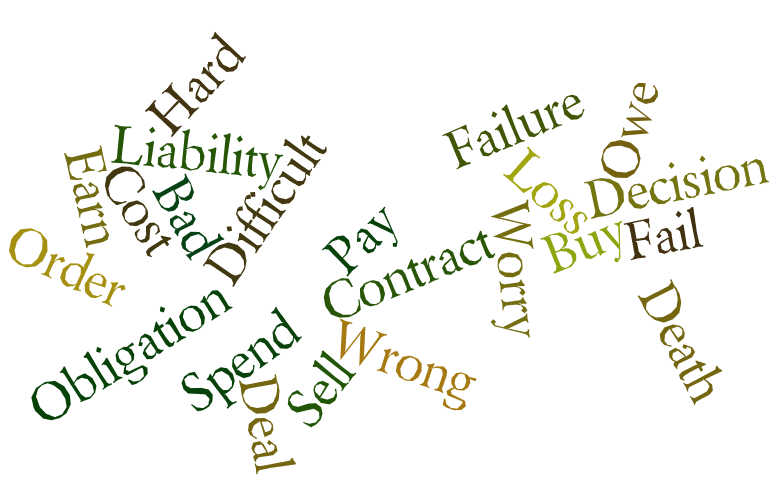Tag: business name
Forget the eye of newt. Put your black cat up for adoption. The wise know that the real magic is in words.
Not just any words — the right words.
At least, that is what I gather from copywriter Sarah Jo Wood of Evolving Advisors Inc. in Toronto, Ontario. She was kind enough to send me a list of words to avoid. Apparently, readers who see these words run screaming into the night, or at least shudder and turn away.
Here are the words of woe that she says can jinx your writing:
See how I can use those words, underlining them as I go:
As a business and trial lawyer writing on business and law, it is hard to see how I can meet my obligation to my readers without using those “wrong” words. Suppose I want to analyze a difficult decision to sign a contract to buy or sell in order to earn. I must consider what may worry the business person more than death — failure. A business deal gone bad can cost money; what you owe you usually must pay. There are ways to lower the risk of liability and loss, but worry is a cost of doing business. If you spend your life in a fantasy you should expect to fail.
Maybe that paragraph sounds negative, but could I say those things without most of those words?
That said, Sarah does have a point. Words have more than their literal meaning. They have associations and implications, mood and tone. They pick things up from the company they keep like butter can pick up tastes in a refrigerator.
Mark Twain famously said, “The difference between the right word and the almost right word is the difference between lightning and a lightning bug.”
I have to admit that looks nothing like a bug of any kind.
In advertisements people never “spend,” they “invest.” Of course, vacation trips and other luxuries are consumption, not investment, but the advertisers use the more appealing word anyway. I suspect they know what they are doing.
Suppose you want to influence your audience’s attitude towards a man. There are many ways you could accurately refer to him. Depending on your audience and what attitude you want, you could call him the biker, the Harley rider, the motorcyclist, Dr. Maniple, the pediatrician, the doctor, the baby doctor, and so on.
For an average middle-class audience the words from “Dr. Maniple” are more positive than “biker” or “Harley rider.” The word “pediatrician” could come across as stuffy, pretentious, or confusing to some audiences but clear and appealing to medical people. Those who have had good dealings with Harley-Davidson motorcyclists might find “Harley rider” very positive.
These differences can matter in court, in novels, in advertising, in fact in any communication.
Even synonyms do not mean exactly the same thing. For example, someone who is “prosperous” probably does not have as much as someone who is “wealthy.” Haute cuisine is not described as “yummy.” A “lovely” woman is more refined than a “hottie.”
Consider word choice and business names.
“Ben & Jerry’s” seems friendlier and less corporate than “A Division of Unilever.” Ben & Jerry’s now actually is a division of Unilever but does not sell Unilever ice cream. It just would not sound as good as Ben & Jerry’s.
What about a string-of-initials name? The idea is that since IBM is a famous corporate giant your small business startup will impress with a name like RKZZP Corp. But such a name can make your branding efforts harder. Who can even remember “RKZZP Corp.”?
The string-of-initials name does not make the famous corporate giant impressive; the fact of being a famous corporate giant lets it get away with using a dud name.
Word choice matters but it is not all that matters. Shakespeare, the great master of word choice, wrote “a rose by any other name would smell as sweet”. I would add, an “unauthorized effluent release” would smell as bad.
But put the right words with the right substance, and now you have magic.
You yearn for your business to survive and thrive. But what if your small business start-up flops, either early or after the business gets big?
There is a way to get limited liability protection So the creditors cannot go after your house, your car, your savings…
Consider Salomon. You might ask, “how can any salmon, no matter how delicious and packed with omega-3 fatty acids, give me limited liability protection?” Even with lemon butter, or teriyaki sauce, or a maple-soy glaze, it seems like too much to ask. Excuse me, I’m getting hungry —
I’m back. Where was I? Oh yes, Salomon, which actually has nothing to do with salmon despite the similar spelling.
In Salomon v. Salomon & Co. Ltd., [1895-9] All E.R. 33, Britain’s House of Lords saw a corporation created for limited liability. One man owned almost all the shares and ran the business. Even so, the corporation counted as a separate legal entity from him. So it, and not the man, was liable for its debts.
This is still good law today. With a few exceptions, like fraud and some torts, the debts are the corporation’s alone.
Limited liability is not a trick — it is why they invented corporations in the first place.
For limited liability you first have to create a corporation. But just incorporating is not enough for solid protection. You should also organize, maintain, and use your corporation.
Organize
Once you have articles of incorporation you should organize. This includes holding a first directors meeting to make by-laws, appoint officers, and so on. You can ask a lawyer to help you take all the steps — not just those I mentioned.
Maintain
Maintenance includes holding annual shareholders’ meetings, keeping the Minute Book up-to-date, registering changes with the government, and other steps. Again, a lawyer can help.
Use
Use the corporation for your business.
Use its exact legal name on documents. Documents like contracts, purchase orders, invoices, business cards, and letters. If you rarely mention your corporation, creditors will argue that you are personally liable.
Exact Legal Name
When I say “exact legal name”, I mean it. Not a similar name, the exact name.
“Joe’s Fish Emporium” is not the same as “Joe’s Fish Emporium Limited”. The first name does not say there is a corporation. So Joe, or whoever runs the business, might be personally liable. The second name says there is a corporation. Probably there is limited liability.
Do not use “Joe’s Fish Emporium Unlimited” because it sounds cooler than “Joe’s Fish Emporium Limited.” The word “Unlimited” implies that there is no limited liability.
“Joe’s Natural Fish Emporium Limited” or “Joe’s Fish Emporium Ltd. Corp.” also create risks if the exact name is “Joe’s Fish Emporium Limited”.
Surprisingly often I have seen people use different names from the exact name. They run a needless risk.
Make sure you know the exact name. The articles of incorporation will not always tell you, because the name could have changed. The safest way is to search with the government.
If you want to use a different name — even a little different — change the name properly and register the change.
Lending
Buying shares is not the only way to put money into your corporation. You can also lend money to it. You can even take security for the loan.
This opens up interesting possibilities. I wrote about some in The Bottom Line, a magazine for accounting and financial professionals. To see the article go to: Can Your Client Be Saved By A Private Receivership?
With wise use of a corporation you should not face financial ruin even if an unexpected disaster swamps your business. You could keep eating, and plan your business comeback.
###
P. S. My thanks to Paul Tobey of http://www.trainingbusinesspros.com/, who made a suggestion that improved this post.




